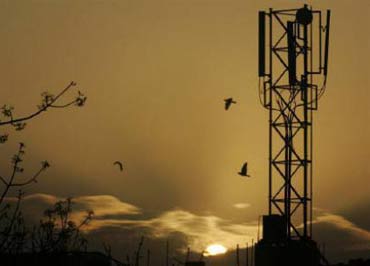
Imagine, just for a moment, if the sale of telecom spectrum resulted in a cash payment directly into the hand of every Indian citizen. That may sound absurd.
And yet there is a corner of the world where petroleum reserves were, sort of, treated as a 'commons' and their sale now earns every local resident an annual revenue.
The 2G spectrum scandal is not just another case of corruption. It challenges us to look more deeply at our role as citizens -- in demanding a say about how commons are utilised and monetised.
To counter the general impression that commons are a thing of the past, or the concern of romantic idealists, we will look at the Alaska Permanent Fund and how it turned oil reserves into annual dividend payments to the people of Alaska.
But, first, it is important to observe why consumer advocates are lamenting the blame game over theft of 2G spectrum. They find the focus on a handful of politicians largely misplaced.
. . .

What actually needs urgent attention, they argue, are fundamental systemic distortions which lead to not just outright theft but policies that fail to serve the larger common good.
The real issue, according to Achintya Mukherjee, founder of the Bombay Telephone Users Association (BTUA), is the corrosion of the constitutional process. He traces the roots of the current scandal to the manner in which the National Telecom Policy was railroaded through Parliament with disregard for procedures and safeguards that consumer groups had advocated.
"An oligarchy has taken over the entire democratic system," says Mukherjee. "Major policies have become the prerogative of the executive with Parliament not even able to provide checks and balances."
Quite apart from outright corruption this power equation has resulted in severe distortions that hurt all of us. Mukherjee argues that various policies of the government have created artificial scarcity conditions in telecom spectrum. The consequentially higher charges are a burden to the consumer.
The loss to consumers is further deepened by slack measures to foster competition between cell phone operators.
. . .

For instance, for years consumer groups were ignored when they clamoured for billing on a per-second basis. Number portability, another essential element of a more competitive marketplace, was finally conceded after years of lobbying by consumer groups, but is yet to be enforced.
Prevailing policies also enable cell phone operators to hoard spectrum, says Mukherjee, thus encouraging formation of cartels.
These and other consumer concerns will continue to be tackled by advocacy groups like BTUA.
But a more fundamental anomaly, underlying this controversy, is outside the purview of such groups.
After all, these scarcity-based profits are being earned on what belongs to all of us but is actually 'owned' by no one. Like air, telecom spectrum is a commons.
. . .

Governments claim 'ownership', or licensing authority, over such commons on behalf of their citizens. Cell phone companies eventually charge their consumers to recover whatever they paid for the use of the spectrum.
So as consumers we wind up paying for, not just the devices and services that tap the spectrum, but the commons itself.
In the current market system this seems both logical and necessary -- once anything is defined as a scarce resource. Thus, when we recognised the limits of the sky's carbon-holding capacity, markets for carbon trading followed. These markets are essentially selling a commons -- namely the sky's carbon-carrying capacity.
Consequently, some business innovators and social activists in the United States are challenging why either governments or private companies should collect the payments for the use of such commons.
Peter Barnes, a California-based businessman and author of the book Capitalism 3.0 (www.capitalism3.com) is lobbying for a Congressional Act that would establish a Sky Trust which would collect payments from companies and individuals for putting carbon in the sky.
. . .

This Trust would in turn pass on these 'carbon fees' to every American citizen on an annual basis.
Barnes is inspired by the example of the Alaska Permanent Fund, which gives an annual dividend to the citizens of this American state, from the sale of its oil reserves.
From 1982 through 2009, the fund's dividend programme paid out about $17.5 billion to Alaskans through the annual distribution of dividend checks. This dividend programme, says the fund's web site: "has a significant effect on the state's economy. Dividends represent an important source of income for some Alaskans, particularly those in rural Alaska. The dividend program is administered by the Dividend Division of the Department of Revenue. Alaskans must apply each year to receive a dividend." (www.apfc.org)
In 2010, this dividend was about $1,200 per Alaskan. The fund's current market value is a little over $37 billion.
This is not to suggest that the Alaska Permanent Fund is the last word on equitable sharing of a monetised common-resource. But the example is inspiring as proof of how a challenging idea for monetising a common resource, and paying dividends to people, was made workable.
. . .

Of course, there is a vast difference between drilling and selling oil and the use of cellular spectrum. But the precise nature of the industry or service is not the issue here.
The point is that just as we must intensify efforts to prevent theft from the public exchequer, as citizens we also need to be more aware of how commons are claimed and 'sold'.
Benefit-sharing models that reduce the power of both governments and private companies while empowering citizens at large may seem like a fantasy today. But until recently cell phones were only found in science-fiction.
Perhaps we need to have as much, or more, faith in social innovation for more equity as we have in technological innovation.
Rajni Bakshi is the author of the book Bazaars, Conversations and Freedom: For a Market Culture Beyond Greed and Fear, which last week won the Vodafone Crossword jury award in Non-fiction category and the Vodafone-Crossword Popular book award.